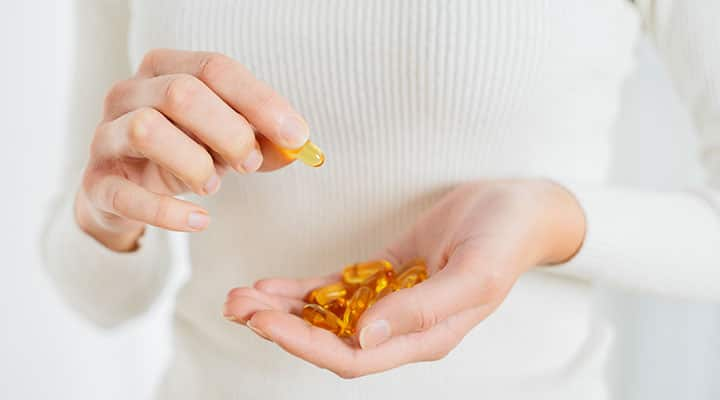
10 Benefits of Grape Seed Extract
Published: August 2023
If you want to benefit from the polyphenols from wine but want to avoid the alcohol (and calories), then a grape seed extract supplement may be a "fruitful" addition to your health routine.
Grapes (Vitis vinifera and Vitis labrusca) have been used as far back as ancient Greece for their presumed health-promoting benefits. Modern science has since shown that there may be some truth to what our ancient ancestors believed about these jewels of the vine.
Just like many other fruits, grapes have been studied for a wide array of benefits—ranging from heart health to overall longevity. However, the seeds of the grape may provide different antioxidants than the actual fruit. Here are 10 reasons why this supplement is "grape" for your health!
What is grape seed extract?
Just as the name implies, grape seed extract is an extract from the seed (and not the fruit) of grapes. Grape seed contains high amounts of polyphenols, which are types of antioxidants that have specifically demonstrated evidence to support a healthy cardiovascular system and already-healthy blood pressure, and to promote longevity.
While all polyphenols are good for you, the ones found in the grape seed are a specific type known as oligomeric proanthocyanidins, or just proanthocyanidins for short, and these have unique benefits. Besides grape seeds, other proanthocyanidin-rich foods include tea, black currant, bilberry, and cranberry. For the plants themselves, proanthocyanidins serve as a defense against predators and other threats found in nature, but for humans, they provide free radical protection and many other health benefits.
Grape Seed Extract vs. Resveratrol: What’s the Difference?
If you thought grapes were a superfood strictly because they contain resveratrol, you're not alone. Resveratrol indeed is a good reason to eat grapes, but it's not the same thing as grape seed extract, nor does it have the exact same benefits. Grape seed extract comes from the seeds of the grape, whereas resveratrol is found in the skin of the grape.
Aside from the part of the grape it comes from, resveratrol is different from grape seed extract in that it activates unique genes—sometimes called our "longevity genes"—which encode the instructions for the body to create proteins called sirtuins. Preclinical research has shown that activation of sirtuin genes can extend lifespan. Activation of these same genes also occurs during calorie restriction, which has also been associated with longevity.
On the other hand, grape seed extract has a high concentration of vitamin E and proanthocyanidins, which means it may offer other benefits that resveratrol does not.
One thing resveratrol and grape seeds have in common: both are powerful antioxidants that fight free radicals.
10 possible benefits of grape seed extract
Drinking wine in moderation is associated with many health benefits, but taking a grape seed extract is an alcohol-free way to possibly obtain them. So far, research into grape seed extract is ongoing, but the evidence suggests that it may be able to help with the following:
1. Helps maintain already-healthy blood pressure
Grape seed extract may help support healthy blood pressure levels by boosting your levels of nitric oxide, which dilates blood vessels.
2. Supports stress management
In addition, grape seed extract may support blood pressure levels already in the normal range by making it easier for you to keep a handle on stress (because it's not a myth that these two are related!). A study found that supplementing with this nutrient for 16 weeks was good for both blood pressure and stress levels.
3. Healthy blood flow
The nitric oxide-boosting properties of grape seed have an additional benefit: supporting healthy blood flow. They also support healthy levels of platelets, which help with clotting blood. An interesting study found that 14 days of daily intake of a grape seed extract supplement improved leg comfort in women who sat for prolonged periods of time. Pro tip: another way to head off the health issues that can come from being sedentary is to work on glute strengthening.
4. Brain health
Grape seed may benefit your memory. Preclinical research has shown that the proanthocyanidins in grape seed extract promote basal synaptic transmission in the part of the brain known as the hippocampus, which is intimately involved in memory. In clinical research, grape seed extract has led to some improvements in cognitive function, but the results are mixed, therefore more research is needed.
5. Cell health
Good health begins at the cellular level. Multiple preclinical studies have shown that grape seed proanthocyanidins support healthy cell division and growth.
Explore Our Best Heart Health Supplements
6. Liver health
Some preliminary clinical research has found that grape seed extract is associated with liver health benefits. These benefits may be extended further when combined with other antioxidants like vitamin C.
7. May support kidney health
Certain kidney health biomarkers such as GFR and creatinine have demonstrated improvements with grape seed extract supplementation—however, this research is also preliminary.
8. Beautiful skin
There may also be advantages to topical applications of grape seed extracts (such as face creams). Grape seed extract cream applied to the cheeks twice a day has resulted in significantly decreased melanin and increased elasticity and moisture sebum compared to placebo.
9 and 10. Supports oxidative stress and a healthy inflammatory response
A meta-analysis of 19 studies found that grape seed extract compared to placebo improved biomarkers of oxidative stress and reduced C-reactive protein levels, which is a systemic marker of inflammation. The antioxidant benefits of grape seed extract are important for your whole-body wellness, including your brain, heart and beyond.
How to take grape seed extract
As with any dietary supplement, follow the product label for safety and optimal dosing. Many high-quality supplements recommend a dosage of 100 mg per day, or as recommended by your healthcare practitioner.
4 other ways to support your heart health
Grape seed extract isn't the only supplement that may have heart health-supporting properties. Here are our top four picks to add to your regimen along with grape seed extract.
1. CoQ10
CoQ10 is essential for healthy mitochondrial function, a process that produces the body's natural energy molecules called ATP. Proper mitochondrial function is essential for multiple aspects of health, especially a healthy cardiovascular system. A meta-analysis of 26 trials found that people who took CoQ10 supplements had better cardiovascular support than those who took placebo.
2. Omega-3
Getting enough omega-3s is critical to maintaining optimal heart health. Not only do these healthy fats encourage a healthy inflammatory response, but they also help to maintain healthy levels of LDL and HDL cholesterol and triglyceride levels.
3. Vitamin D & K
Calcium is an important mineral—as long as it's in the right places: your bones, and not within vascular tissue, which can be unhealthy for the heart and blood vessels. This is where vitamin D and K come in. Together, they optimize the proper delivery of calcium in the body. Vitamin D enhances calcium delivery by increasing the absorption of calcium through the intestinal walls. After it's absorbed, vitamin K directs it to your bones.
4. Magnesium
A heartbeat is not complete without magnesium! Since magnesium helps cardio muscle fibers relax after each heartbeat, it's essential for heart health and healthy blood pressure. In fact, a meta-analysis of seven randomized-controlled trials found that those who took oral magnesium supplements had better supported healthy blood pressure compared with those who took a placebo.
References
- Abdelhamid AS, et al. "Omega-3 fatty acids for the primary and secondary prevention of cardiovascular disease." Cochrane Database Systematic Reviews. February 2020. https://pubmed.ncbi.nlm.nih.gov/32114706/
- Asbaghi O, et al. "The Effects of Magnesium Supplementation on Blood Pressure and Obesity Measure Among Type 2 Diabetes Patient: a Systematic Review and Meta-analysis of Randomized Controlled Trials." Biol Trace Elem Res. February 2021. https://pubmed.ncbi.nlm.nih.gov/32385715/
- Calapai G, et al. "A Randomized, Double-Blinded, Clinical Trial on Effects of a Vitis vinifera Extract on Cognitive Function in Healthy Older Adults." Front Pharmacol. October 2017. https://www.ncbi.nlm.nih.gov/pmc/articles/PMC5671585
- Claxton L, et al. "Coenzyme Q10 to manage chronic heart failure with a reduced ejection fraction: a systematic review and economic evaluation." Health Technology Assessment. January 2022. https://pubmed.ncbi.nlm.nih.gov/35076012/
- Foshati S, et al. "The effect of grape seed extract supplementation on oxidative stress and inflammation: A systematic review and meta-analysis of controlled trials." Int J Clin Pract. November 2021. https://pubmed.ncbi.nlm.nih.gov/34107109/
- Khoshbaten M, et al. "Grape seed extract to improve liver function in patients with nonalcoholic fatty liver change." Saudi J Gastroenterol. July-September 2010. https://pubmed.ncbi.nlm.nih.gov/20616415
- Olaku OO, et al. "The Role of Grape Seed Extract in the Treatment of Chemo/Radiotherapy Induced Toxicity: A Systematic Review of Preclinical Studies." Nutrition and Cancer. April 2015. https://pubmed.ncbi.nlm.nih.gov/25880972/
- Sano A, et al. "Proanthocyanidin-rich grape seed extract reduces leg swelling in healthy women during prolonged sitting." Journal of Science and Food Agriculture. February 2013. https://pubmed.ncbi.nlm.nih.gov/22752876/
- Schön C, et al. "Grape Seed Extract Positively Modulates Blood Pressure and Perceived Stress: A Randomized, Double-Blind, Placebo-Controlled Study in Healthy Volunteers." Nutrients. February 2021. https://www.ncbi.nlm.nih.gov/pmc/articles/PMC7922661/
- Sharif A, et al. "Formulation and evaluation on human skin of a water-in-oil emulsion containing Muscat hamburg black grape seed extract." International Journal of Cosmetic Science. April 2015. https://pubmed.ncbi.nlm.nih.gov/25402429/
- Shenoy SF, et al. "Effects of grape seed extract consumption on platelet function in postmenopausal women." Thrombosis Research. October 2007. https://pubmed.ncbi.nlm.nih.gov/17950783/
- Van Ballegooijen AJ, et al. "The Synergistic Interplay between Vitamins D and K for Bone and Cardiovascular Health: A Narrative Review." Int J Endocrinol. September 2017. https://www.ncbi.nlm.nih.gov/pmc/articles/PMC5613455/
Always be in the know!
Access the latest deals, wellness news, expert health tips & more!










